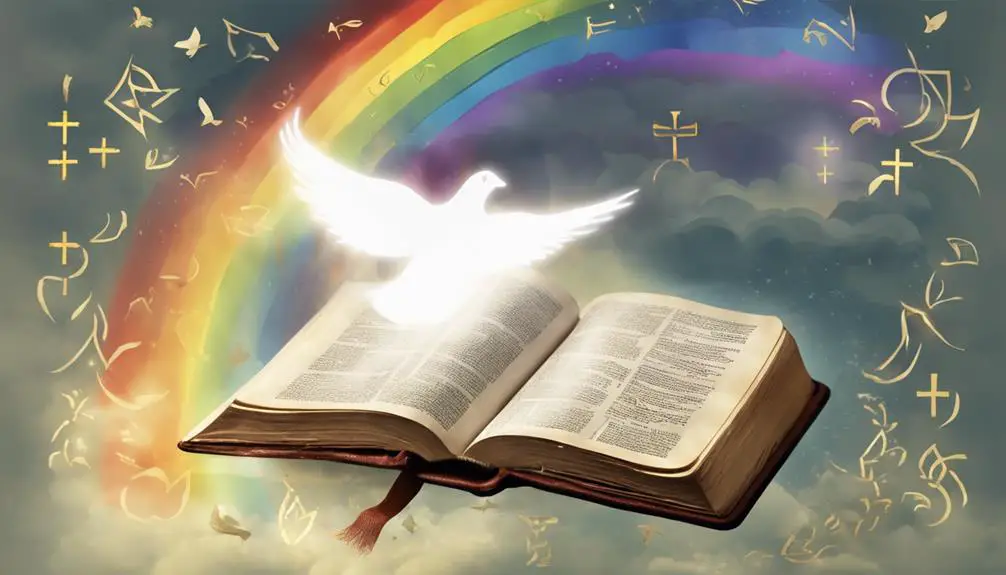Uncover timeless wisdom and profound insights in these top Bible books, each offering unique lessons for a fulfilling life.

Best Books in the Bible to Read
Have you ever wondered which books of the Bible offer the most profound insights for your life? You're not alone in this quest.
The Book of Psalms provides unparalleled comfort and guidance, while Proverbs offers wisdom that remains relevant through the ages. Then there's the Gospel of John, with its deep dive into love and truth, and Genesis, which lays the groundwork for our understanding of the world.
Don't overlook the Story of Ruth, a testament to loyalty and love, or Revelations, which paints a picture of hope in prophecy. Each book has its unique voice and lessons, beckoning you to explore further and uncover the riches within.
Key Takeaways
- Psalms offers a rich emotional landscape, ideal for those seeking solace and spiritual upliftment.
- Proverbs provides practical wisdom on living a moral and disciplined life.
- The Gospel of John delves deep into Jesus' divine nature, offering insights into faith and salvation.
- Revelations inspires with its vivid imagery and the promise of hope and renewal.
Exploring the Book of Psalms

Delving into the Book of Psalms reveals a rich tapestry of poetic expressions, offering profound insights into the human experience of seeking divine connection. This collection, often described as musical poetry, serves not just as a historical record of ancient worship practices, but as a timeless guide to emotional resilience. As you explore its verses, you'll find that Psalms encapsulates a wide range of human emotions, from the depths of despair to the heights of joy, teaching us the power of faith in navigating life's tumultuous waters.
The musical aspect of Psalms isn't merely ornamental. It underscores the belief that melody can elevate words, transforming personal lamentations and praises into a communal experience of spiritual upliftment. This fusion of music and poetry in Psalms makes it uniquely effective in reaching the heart, demonstrating how art can bridge the gap between the mortal and the divine.
Furthermore, the emphasis on emotional resilience found throughout Psalms offers a profound lesson on the human condition. It acknowledges the inevitability of suffering, while simultaneously providing a roadmap for finding solace and strength in faith. This duality, where vulnerability meets unshakeable trust in God, encapsulates the essence of emotional resilience as depicted in Psalms.
The Wisdom of Proverbs

Building on the emotional landscapes explored in the Book of Psalms, the Book of Proverbs offers a complementary perspective, focusing on practical wisdom and moral guidance for daily living. You'll find that it's not just a collection of sayings but a deep reservoir of life lessons, meticulously designed to guide you through the complexities of human nature, relationships, and ethical dilemmas.
As you delve into Proverbs, you'll notice its distinct approach to imparting wisdom. It doesn't just instruct; it enlightens, offering practical guidance that resonates across ages and cultures. Here are some ways Proverbs can enrich your understanding and decision-making:
- Moral clarity: Proverbs emphasizes the black-and-white nature of right and wrong, encouraging you to choose the path of integrity.
- Self-discipline: It advocates for control over one's impulses, suggesting that patience and discipline are key to achieving one's goals.
- The value of hard work: Laziness is often criticized, while diligence is upheld as a virtue that leads to success.
- Navigating relationships: Insights on friendship, marriage, and community interactions highlight the importance of understanding and empathy.
- Financial wisdom: Practical advice on wealth management and the dangers of debt offer timeless lessons on financial prudence.
Proverbs doesn't just offer ancient wisdom; it provides a blueprint for living a fulfilled and ethical life in the modern world. Its practical guidance and life lessons are as relevant today as they were centuries ago, making it a vital read for anyone seeking to navigate life's challenges with wisdom and integrity.
The Gospel of John: A Deep Dive

Transitioning from the practical wisdom of Proverbs, we now turn our attention to the Gospel of John, a profound exploration of spiritual truths and the nature of Christ's divinity. John's Gospel stands out for its unique approach to Jesus' identity, emphasizing His divine nature and eternal existence. Unlike the synoptic gospels, John delves deeper into the philosophical and theological implications of Jesus' words and actions, offering you a nuanced perspective on His mission and essence.
John's symbolism is rich and multifaceted, serving as a key to understanding the text's deeper meanings. Water, light, and bread, among others, aren't merely elements of the narrative but symbols that reveal aspects of Jesus' identity and His offer of eternal life. For instance, Jesus' declaration as the 'light of the world' isn't just a metaphor but a revelation of His role as the source of spiritual enlightenment and salvation.
Moreover, John's Gospel invites you to contemplate the concept of the Word made flesh, presenting Jesus as the preexistent Logos who embodies God's creative and salvific power. This portrayal encourages a reflection on the interconnectedness of divine and human nature, challenging you to grasp the full scope of Jesus' significance.
In essence, the Gospel of John serves as a cornerstone for understanding the profound mystery of Christ's identity. Through its symbolic language and theological depth, it encourages you to explore the intricate relationship between the divine and the human, offering insights into the nature of faith, salvation, and eternal life.
Genesis: The Beginnings

Embarking on the journey through Genesis, you'll uncover the foundational narratives that set the stage for the entire biblical saga, revealing the complex relationship between God, creation, and humanity. Genesis isn't just a book of beginnings but a profound exploration of human nature, divine intention, and the intricate dance between free will and destiny.
Analyzing Genesis, you'll delve into:
- Creation stories: These narratives are rich in symbolism and theological insights, offering profound reflections on the nature of God and the universe. They set a precedent for understanding humanity's role within creation, emphasizing stewardship and responsibility.
- Family dynamics: Genesis is replete with stories of families, from Adam and Eve to Abraham, Isaac, and Jacob. These tales aren't sugar-coated; they present the raw and often painful realities of family life, including favoritism, betrayal, and reconciliation. Through these narratives, Genesis portrays the complexities of human relationships and the enduring bonds of family.
- The moral and ethical dilemmas faced by its characters, which are as relevant today as they were thousands of years ago.
- The covenant between God and Abraham, which not only defines the relationship between the divine and Abraham's descendants but also introduces the concept of a chosen people with a divine mission.
- The dramatic saga of Joseph, which illustrates themes of forgiveness, divine providence, and redemption.
Genesis invites you to ponder the origins of the universe and humanity's place within it, challenging you to reflect on your own existence and the moral complexities of life. Through its timeless stories, Genesis offers invaluable insights into the human condition and the divine narrative.
The Story of Ruth: Love and Loyalty

After exploring the foundational narratives of Genesis, we turn our attention to the Book of Ruth, a powerful exploration of love and loyalty amidst adversity. Unlike the grand cosmological or patriarchal narratives, Ruth offers a more intimate, human-centered story. It's a tale that resonates deeply because of its focus on personal commitment and Ruth's resilience in the face of cultural and personal challenges.
Ruth, a Moabite widow, chooses to stay with her Israelite mother-in-law, Naomi, instead of returning to her own people. This decision sets the stage for a story that defies the cultural norms of the time. Ruth's resilience isn't just in her survival but in her ability to navigate and transform her circumstances through acts of love and loyalty. Her story is a testament to the strength found in kindness and dedication, even when it crosses cultural boundaries.
The cultural context of Ruth's story adds layers to its understanding. It's a narrative that challenges the Israelite views of outsiders and widows, portraying them as capable of loyalty and deserving of love and protection. Ruth's integration into the Israelite community and her eventual marriage to Boaz, a relative of Naomi, underline the themes of redemption and divine providence.
Ruth's story is an insightful exploration of how love and loyalty can create new beginnings and challenge societal norms. It teaches that resilience, when combined with compassion, can lead to unexpected blessings and a legacy that transcends cultural and personal barriers.
Revelations: Prophecy and Hope

The Book of Revelation stands as a complex tapestry of prophecy, offering a vision of hope amid apocalyptic foretellings. As you delve into its chapters, you're engaging with a text that's both enigmatic and profoundly inspiring. This book's unique blend of end times analysis and symbolic interpretations has fascinated scholars and believers alike for centuries.
- Vivid imagery and symbols: Revelation is filled with dramatic visions and symbols, from the Four Horsemen to the Dragon, each offering deep allegorical meanings that resonate with the challenges and triumphs of faith.
- Messages to the seven churches: These letters provide timeless counsel and warnings, reflecting the universal struggles of faith communities, and encouraging steadfastness.
- The promise of renewal: Amidst its warnings, Revelation paints a picture of a new heaven and a new earth, where justice and peace prevail.
- The role of faith: The book underscores the importance of faithfulness and perseverance in the face of trials, offering a profound message of hope to believers.
- Interpretive diversity: Revelation's symbolic nature invites a wide range of interpretations, enriching the study of biblical prophecy and eschatology.
Analyzing Revelation requires patience and an open mind. Its symbolic interpretations vary widely, challenging you to consider multiple perspectives in your end times analysis. Yet, despite its complexities, Revelation's core message of hope and redemption shines through, offering a powerful vision of God's ultimate victory over evil.
Frequently Asked Questions
How Do the Themes Explored in the Selected Books of the Bible Reflect on Personal Development and Mental Health?
You're exploring how themes in certain texts reflect on personal development and mental health. These themes often cultivate personal growth and emotional resilience.
Analyzing them, you'll find insights into overcoming adversity, forgiveness, and self-discovery. Such narratives provide powerful examples of strength, hope, and renewal, crucial for mental well-being.
They encourage a deeper understanding of oneself and the journey towards emotional resilience, offering a scholarly perspective on the transformative power of story and faith.
Can the Ethical Dilemmas Presented in These Books Provide Guidance on Modern-Day Social Issues, Such as Climate Change or Technological Advancements?
Absolutely, the ethical dilemmas highlighted can guide you through current social issues. They push you towards ethical consumerism, urging you to consider the impact of your purchases on the environment and society.
Similarly, these narratives advocate for corporate responsibility, encouraging companies to act ethically in the face of technological advancements and environmental challenges.
How Do Different Denominations of Christianity Interpret the Teachings and Stories Differently Within These Selected Books?
You'll find that various Christian denominations interpret the teachings and stories in the Bible differently, influenced by their unique liturgical practices and the outcomes of ecumenical councils.
These differences shape their understanding and application of biblical texts, leading to varied perspectives on faith and morality.
Such diversity highlights the richness of Christian tradition, offering you a deeper insight into how beliefs evolve and adapt in response to theological and doctrinal developments.
What Are the Historical and Cultural Contexts Behind the Authorship and Compilation of These Particular Books of the Bible, and How Do They Affect Their Interpretation Today?
Ever wondered how ancient texts shape your understanding today?
The historical and cultural contexts behind the authorship and compilation of biblical books are pivotal. Understanding manuscript origins reveals much about their initial purpose and audience.
Canon formation, a complex process influenced by theological, political, and social factors, significantly affects how these texts are interpreted today.
Unpacking these elements offers you a deeper, more nuanced grasp of their enduring relevance.
How Can Non-Religious Readers Gain Insights or Find Value in the Narratives and Teachings of These Selected Books of the Bible?
As a non-religious reader, you'll find the Bible's selected books rich in literary techniques and universal themes, such as justice, love, and redemption.
These elements offer profound insights into human nature and society. By analyzing the narratives and teachings from an academic perspective, you'll uncover layers of meaning that resonate across cultures and epochs.
This scholarly approach enables you to appreciate the texts' historical significance and their impact on contemporary thought and values.
Conclusion
In conclusion, you've journeyed through the spiritual landscapes of Psalms' poetic beauty, Proverbs' sage advice, the profound depths of John's Gospel, Genesis' epic beginnings, Ruth's heartwarming tale, and Revelation's hopeful prophecies.
Each book, a mosaic piece, completes the picture of life's complexities and divine wisdom. Isn't it remarkable how ancient texts still resonate today, offering insights into our most profound questions about existence, morality, and the human spirit?
Engage with these books; they're not just readings but lifelines to wisdom past and present.



Sign up